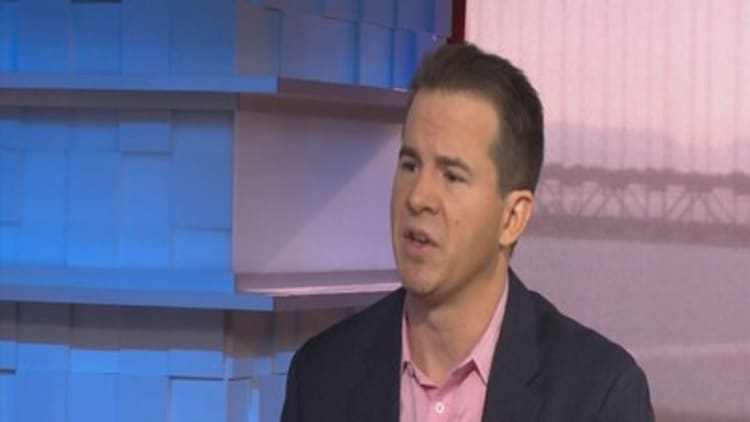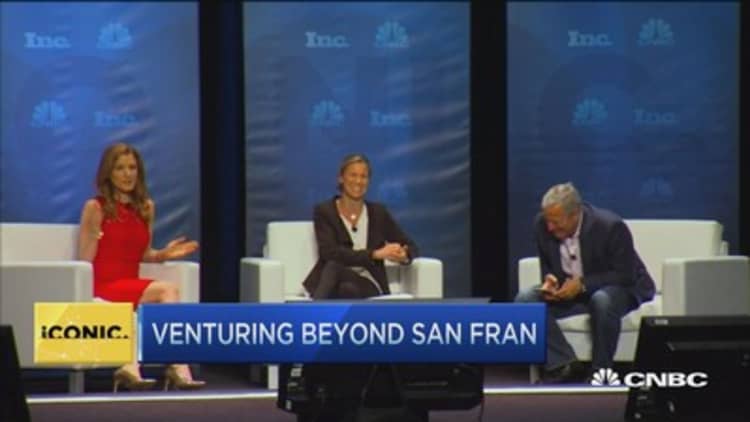Silicon Valley is cooling, not crashing. Valuations are falling. The era of cheap money is over.
Based on interviews with about two dozen venture capitalists and tech investors, 2016 is shaping up to be a year of reckoning for scores of technology start-ups that have yet to prove out their business models and equally challenging for those that raised money at unjustifiably high prices.
"It's been surprising to see how quickly valuation expectations are recalibrating," said Craig Hanson, a partner at Next World Capital in San Francisco. "Rounds will be harder to raise, valuation multiples will be lower and, in many cases, companies will have to demonstrate metrics that back up the big projections they promised before."
Or, as Todd Chaffee of Institutional Venture Partners describes the environment, "The cheap capital party is over, but there are a few drunk sailors who didn't hear last call."
The downdraft began in mid-August, when the S&P 500 plunged 11 percent in a week, due primarily to concerns about slowing growth in China. Even with public stocks regaining most of their losses, IPOs remained weak, with tech companies going public at the slowest rate since 2009, and most of those that hit the market failing to reward late-stage investors.
High-profile consumer start-ups are feeling the pinch. Evernote and One Kings Lane are cutting staff, Rdio was acquired out of bankruptcy, Gilt Groupe is nearing a sale for a fraction of its peak valuation (according to The Wall Street Journal) and Dropbox shut down two products.
In the absence of IPOs, employees at highly valued start-ups are trying to sell some of their shares on the secondary market, but buyers are increasingly scarce.
Spotify prices have drifted below the last round ($8.5 billion valuation), according to Larry Albukerk, managing partner at EB Exchange Funds, which facilitates transactions. Dropbox engineers are struggling to find buyers as are employees at food delivery services like Instacart and DoorDash, Albukerk said.
Uber, Lyft and Airbnb remain "white hot" for investors, he said, but in general "there is less appetite on the buy side for secondaries."

For companies that sell to the enterprise, mid- and late-stage investors are taking a cue from the stock market, where newly listed companies like Box and Pure Storage are trading at valuations that are in line with or below their last private rounds.
Couple that with Zenefits, which admitted to falling short of sales growth expectations and is now cutting back on costs. Just seven months ago — and two years after its founding — the developer of online human resources software was valued at $4.5 billion.
Enterprise companies are now being forced to raise at more realistic prices.
According to Byron Deeter of Bessemer Venture Partners, late-stage private cloud companies on average are being valued at 11.8 times revenue, down from a peak multiple of 15 earlier in the year.
Cumulus Networks, which helps deliver computer networking capabilities through software, is likely to take money at a price below its $300 million valuation from last year, said people familiar with the company who asked not to be named because the fundraising is still underway. While a novel technology, the product is proving difficult to commercialize, the sources said. A Cumulus spokesperson declined to comment.
Read MoreWhat the Fed hike means for start-ups
"It's a tale of two cities," said Asheem Chandna, a partner at Greylock Partners in Menlo Park, California. The top-tier companies see plenty of investor demand, "but if you take the broader market beyond the top 10 to 20 percent it's fair to say there's an adjustment happening," he said.
In other words, some start-ups are still seeing valuation markups.
Datadog, a provider of cloud monitoring tools, is raising cash at a close to $600 million valuation in a round led by Iconiq Capital, said people familiar with the deal. While the price marks a significant increase from its previous round in January, the company has the revenue and growth to justify the price, the sources said.
We're coming back to normalcy where fundamentals matter.David Wadhwani, AppDynamics CEO
Mesosphere, whose technology helps developers deploy apps and move workloads, and Databricks, which helps businesses with processing big data, are raising money at valuations appreciably above 2014 rounds, said people familiar with the financings.
Representatives from Mesosphere and Databricks declined to comment as did a spokesperson for Iconiq. A Datadog representative wasn't available for comment.
In November, AppDynamics raised money at a $1.9 billion valuation, 16 months after being valued at $1.1 billion. That sounds like a steep climb until you consider that revenue has been more than doubling annually, and as CNBC.com reported in August, billings over the past 12 months reached $175 million.
The company's CEO, David Wadhwani, said there was a real sense of sanity throughout the process.
"We're coming back to normalcy where fundamentals matter," Wadhwani said in an interview after the announcement.
Normalcy is fine for A and A+ companies, VCs say, as well as for start-ups that have been conservative with raising and spending capital. However, it's troublesome for businesses with negative gross margins (losing money on every sale), excessive burn rates, inflated valuations and those operating in competitive markets with cash-rich rivals.
Unfortunately for Silicon Valley, there's no shortage of companies in the troubled category.
U.S. start-ups raised $47.2 billion in the first three quarters of 2015, following $50.8 billion in all of 2014, by far the most since 2000, according to the National Venture Capital Association.
Thanks to hedge funds, private equity firms, mutual fund companies and foreign cash pouring into tech, late-stage investment dollars surged 25 percent in the third quarter from a year earlier.
That adds up to a lot of money chasing the hope of future returns. But hope is rapidly giving way to reality.
"The world of perpetual up rounds is over," said Ajay Agarwal, managing director at Bain Capital Ventures. "That's forcing companies that are much younger to think about cash and profitability in ways they haven't had to think about in the last few years."
Read MoreOut of the way VCs: Banks muscle in on boom
Every investor interviewed for this story said the tone has changed dramatically in the past three months. In particular, start-ups are bringing a different attitude into pitch meetings.
Agarwal said entrepreneurs are acknowledging upfront that they'll have to raise at a valuation comparable to or even slightly below their last round. Dan Scholnick of Trinity Ventures said companies that came in to pitch three to six months ago looking for certain terms are now coming back willing to accept a 50 percent cut.
Battery Ventures partner Dharmesh Thakker said the phrase he has heard a lot over the last 60 to 90 days is "open-minded" in reference to how companies are approaching their value. Meanwhile, Adam Marcus of OpenView Venture Partners said founders have stopped showing up with predetermined terms.
"Now, they say `We're raising, but we'll let the market dictate terms and there's no time horizon,'" he said. "The leverage has swung from the entrepreneur back to the investor."
At the late stage, that means companies with outlandish valuations that are in need of cash often have to choose between a down round or accepting punitive terms like ratchets, whereby investors are guaranteed additional shares if an IPO prices below a certain level. Box and Square employed that tactic.
Either is painful, but down rounds can be disastrous, said IVP's Chaffee.
"They're bad for employee morale, competitive stature and supplier relations," Chaffee said. "It's ugly."
Despite the downturn, investors are quick to point out that this is not a repeat of 2000. Unlike the dot-com crash, headlined by the infamous sock puppet of Pets.com and cash drain of Webvan, plenty of today's businesses have achieved mega valuations because they're upending massive markets or pioneering tech transitions and supplanting incumbent vendors.
Read MoreSigns of a tech bubble?
Other emerging companies are still gaining momentum, playing into hot trends like artificial intelligence, virtual reality and mobile search.
But the grow-at-any-cost mantra is gone, and has been replaced by unit economics. Companies that have counted on large sums of cheap cash to fuel unprofitable growth must find ways to fund future expansion on their own. Acquiring customers efficiently and making a profit on every sale is suddenly essential.
"At every board meeting, we're reviewing burn rates," said George Zachary, a partner at Charles River Ventures in Menlo Park. "Most founders I talk to say the same thing:`Yeah we have to pay attention to burn rates.' It really sunk in over the last couple months."

Early stage companies are not immune to the pain. Angel investor Jason Calacanis said companies coming out of his incubator are only getting 20 to 30 percent valuation increases from their angel to seed rounds, instead of tripling as they were earlier in the year. Every company is also focused on a path to profitability, he said.
Timothy Young, who's personally backed about 45 start-ups, said he's witnessing the most dramatic turn in the market since he started investing in 2011. Deals that previously took six weeks to close are now taking twice that long, for those companies that can even raise money.
"A year ago traction was very sufficient for raising capital," said Young, who is also co-founder of stealth start-up Projector. Not anymore. "We've been in a seller's market, but we're definitely shifting to a buyer's market," he said.
Early stage businesses with seasoned management teams and substantial momentum are still in demand.
Textio co-founder Kieran Snyder said her artificial intelligence software company was able to close its Series A round in six weeks and at the terms it expected. Emergence Capital led the $8 million round, announced on Wednesday, and Snyder said the company is happy with the increase in valuation from the seed round earlier this year. She declined to disclose the terms.
"We weren't in it to seek an insane valuation," said Snyder, who has a Ph.D. in linguistics and spent almost a decade at Microsoft. "It's a fair assessment of where we are."
Read MoreNokia finishing Alcaltel-Lucent deal
So who wins as the broader private market turns? Perhaps the legacy tech companies, who see a whole talent pool opening up.
Bhaskar Gorti, president of IP platforms at networking company Alcatel-Lucent (which agreed to be acquired by Nokia), said he's hearing from a lot of engineers at once promising start-ups. He expects the number to increase in 2016 as capital dries up for companies unable to commercialize their products.
"I am getting quite a lot of resumes from small companies — people who have been there two to three years and are not seeing the end," said Gorti, who's based in San Jose, California. "There are very few that pop big."



.jpg?v=1532564668&w=160&h=90)
